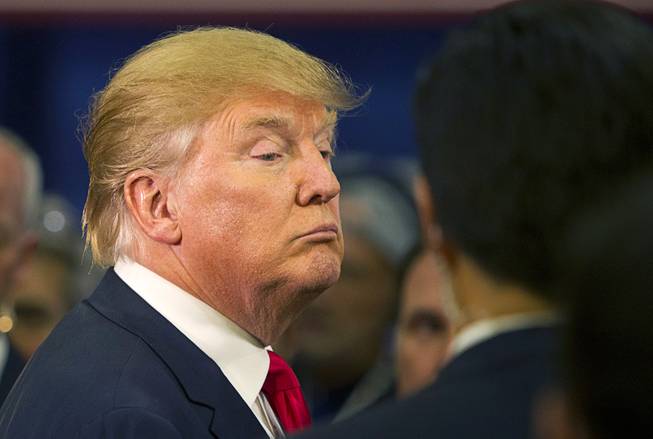
Businessman Donald Trump listens to a question from a reporter in the spin room after the CNN Republican Presidential Debate on Tuesday, Dec. 15, 2015, at the Venetian.
Monday, May 9, 2016 | 2 a.m.
One positions himself as the leader of a revolution, the other as an outsider who’ll rescue the nation from a political establishment that has dragged it into despair.
Bernie Sanders and Donald Trump are very different candidates, but they have one strong common bond. They’ve both benefited from a wave of discontent among Americans, while also helping fuel it.
Their ascension can’t be tied to a single policy. Trump, especially, has offered few details about his strategy other than his campaign-slogan promise to “Make America Great Again.” Sanders’ revolution is tied largely to reforming campaign financing laws to reduce the political influence of corporations and the superwealthy.
But both candidates have succeeded by stirring a desire to do away with the status quo, which in turn has given rise to a campaign environment like none in recent memory. In many ways, they’re speaking to similar frustrations — with the economy, jobs growth and education — though they propose radically different solutions.
Sanders has built up significant momentum over the course of his campaign, but he remains a significant degree behind Hillary Clinton in terms of delegate count. Not so for Trump, who has essentially secured the Republican nomination.
A year ago, few people thought Trump had a real shot at the Republican nomination. Still, a wave of frustrations has swept him closer and closer to that reality.
But that wave didn’t start with him — it was building, in Nevada and across the country, long before he launched his campaign.
Why people like Trump and his authoritarian appeal
Make American great again
Trump’s campaign is built around its slogan “Make America Great Again,” commonly seen embroidered on red hats sold by the campaign. Throughout his campaign, Trump has often been asked the question: When was it that America was last great?
His responses have varied.
Over the summer, Trump told NBC’s Chuck Todd that the country was last great during President Ronald Reagan’s administration.
“You felt proud to be an American,” Trump said. “You felt really proud. I don’t think since then to any great extent, people were proud.”
In March, he told The New York Times that the country was great during periods of industrial expansion at the beginning of the 20th century and in the years after World War II.
“If you look back, it really was, there was a period of time when we were developing at the turn of the century, which was a pretty wild time for this country and pretty wild in terms of building that machine; that machine was really based on entrepreneurship, etc, etc.,” Trump said.
He added that “during the 1940s and the late ’40s and ’50s,” the country was “not pushed around, we were respected by everybody, we had just won a war, we were pretty much doing what we had to do.”
He backtracked slightly on his earlier praise for the Reagan administration, saying “I never felt on trade we did great.”
With Trump, the issues are often black and white.
That’s one of the attributes his supporters say they like about him. They believe he will be a decisive leader who won’t linger in the gray areas. He’s taken bold stances on immigration, ISIS, international relations and more.
“What they’re looking for is someone who simplifies the world, who creates black and white, good and bad categories, a mighty leader who is going to cut through all the problems that are out there,” said Marc Hetherington, a political science professor at Vanderbilt University.
Hetherington studies authoritarianism and has recently linked it with the rise of Trump. Authoritarians tend to be wary of the outside world and uncomfortable with change. People may also have latent authoritarian tendencies that become activated by a threat, either direct and physical, or to societal norms.
“When those threats are out there in the environment and you have someone who is harping on those threats, focusing on those threats, underscoring those threats, those are the combustible point where you can get authoritarian activation,” said Matthew MacWilliams, a doctoral candidate who studies authoritarianism at the University of Massachusetts Amherst.
Authoritarians don’t necessarily ascribe to any one political party, Hetherington said, though because social change has largely come from the Democratic Party in recent years, many authoritarians have migrated to the Republican Party. At the same time, the Republican Party has alienated what Hetherington calls the “patrician country club, socially liberal types” who aren’t comfortable with the way the GOP talks about race and gender.
It’s also more about Trump’s persona than his stance on the issues, Hetherington said.
“It’s really like a style — that social dominance style, like the big, bad dad that Trump embodies — that appeals to people with a certain worldview,” Hetherington said.
It also helps explain why Trump’s supporters don’t necessarily all agree with his comments but still support him, Hetherington added.
This isn’t the first time, though, that someone who appeals to authoritarians has risen to prominence in the political sphere. Hetherington likens Trump to Alabama Gov. George Wallace or Sen. Joe McCarthy, who ascended during the civil rights movement and the Red Scare, respectively. Now, people have to contend with the looming threat of ISIS, societal changes and economic instability.
“It’s actually a really human reaction to the world; it’s just some people have more sensitivity to it than others. And for certain people, the solution is some mighty leader who is going to wrap us all up in a blanket and keep us safe,” Hetherington said.
And now that Trump has sparked this movement, experts say it’s unlikely to go away any time soon.
“Once you let the genie out of the bottle, it’s really hard to get it back in,” MacWilliams said. “If you look at Trump’s supporters — Madisonian democracy, U.S. constitutional rights — they’re willing to throw all that stuff over the curb, off the cliff.”
Issues fueling discontent, support for 'outsiders'
Vermont Sen. Bernie Sanders and Donald Trump are vastly different. But experts see parallels between their campaigns: Trump points his finger at Mexico and China; Sanders points his at Wall Street.
“There’s a really interesting similarity in the economic populism of Sanders and Trump,” said Matthew MacWilliams, a doctoral student at the University of Massachusetts Amherst. “Trump plays up aversion to difference (in terms of race, religion, gender or nationality) whereas Sanders focuses on (how) we’re allowing Wall Street to take advantage of us.”
Sanders uses the word “rigged” to describe the economy, and some of his momentum is an outgrowth of the Occupy Wall Street movement that was frustrated with big banks and economic inequality.
Trump has echoed Sanders’ terminology, calling the GOP primary system “rigged.” Sanders has had the same complaint about the Democratic side.
“I’m not a fan of Bernie Sanders, but it’s a rigged system. The Republican system is a rigged system,” Trump said after losing to Ted Cruz in Colorado and Wyoming.
Trump and Sanders couch themselves as political outsiders, and many of their supporters are new to politics. Trump and Sanders both decry the influence of lobbyists and special-interest groups.
Sanders also has sparked outcry from establishment Democrats, who see his policies as too radical, though not to the extent that Trump has with the Republican establishment. But for those worried about how a Trump or Sanders presidency would affect the United States, experts say the political system has had to deal with extreme presidents before.
“With Ronald Reagan, many thought the sky was falling, that he was uber-conservative,” said Fred Lokken, professor of political science at Truckee Meadows Community College. “They have safety nets involved for a Donald Trump and Bernie Sanders that can only allow them to go so far.”
Anger with the Republican establishment
Go to a Trump rally, and you’ll find a lot of people who are new to politics. Inspired by Trump and his message, they have turned out to rally, caucus and participate in the convention process by the thousands. Some are lifelong Republicans. Others used to be Democrats. The common thread is that they say they’re finally hearing a commonsense message from Trump: no politics as usual, no special interest groups and no pandering.
What his supporters largely share is a disillusionment with establishment politics.
In 2010, the Tea Party sprung out of a similar kind of sentiment. Experts attribute Trump’s rise, at least in part, to the failure of the Tea Party to transform Republican policies in a meaningful way while at the same time creating a schism in the party.
Many of his supporters say they agree with his policies 100 percent. Even if they don’t, his rhetoric strikes a chord with many disillusioned Republicans.
“Trump has made the argument that the system is corrupt, and people find that appealing,” UNLV political science professor David Damore said.
ISIS and national security
Republicans and Democrats are virtually alike in their feeling that ISIS is the biggest threat facing the United States in the Middle East, according to a report from the Brookings Institution. More than half of Americans believe the government should do whatever is necessary to defeat ISIS.
Trump has used bold, no-nonsense language when talking about ISIS, and has called for ground troops to combat the terrorist organization. He has also said that he would “bomb the s—t” out of ISIS as well as kill the families of ISIS terrorists.
Vanderbilt political science professor Marc Hetherington said Trump’s approach to ISIS could appeal to people who feel that the terrorist organization poses a real and immediate threat to the security of the United States. Critics, including a top U.S. general, have said that Trump’s strategy is shortsighted and doesn’t take into account the nuances of collaborating with other countries in the Middle East.
Fatigue with religion
The “religious right,” that is, evangelical Christians with conservative stances on social issues, has played a key role in the Republican Party in past election cycles, but Trump hasn’t made religion — or conservative social issues — key to his campaign. Less than half of Republicans view Trump as religious, according to a Pew Research poll from January.
Trump has also taken relatively liberal stances for a Republican on some social issues.
Asked about North Carolina’s transgender bathroom bill, Trump said the state made the wrong decision. And though Trump opposes abortion, he believes in exceptions in the case of rape, incest or when the health of the mother is in jeopardy.
It’s not that Trump’s supporters aren’t religious — Trump has performed well with self-described evangelical voters in primaries and caucuses across the country. But Trump tends to perform better with evangelical Republican voters who attend church less than once a week, according to a recent Pew poll. That split represents a shift in the Republican Party, between the more religious and the less.
Rapid demographic changes.
Political observers say Trump’s campaign is, in many ways, a backlash against the changes of the past decade. The country elected its first black president. The Black Lives Matter movement has brought issues of racial inequality to the fore. The U.S. immigrant population is at an all-time high.
To top it off, the demographics of the country are changing rapidly. In just a few decades, whites will no longer make up the majority of the U.S. population.
Trump’s support spans demographic groups, but a significant portion of it comes from low-income whites, who feel increasingly sidelined. They’re suffering from the shift away from a manufacturing economy, from wage stagnation and from an opioid epidemic that has taken root specifically among that demographic.
They see the country’s first black president addressing issues that disproportionately affect the black community, such as police brutality, mass incarceration and lack of access to opportunity. But they haven’t seen the same attention devoted to issues in the white community.
“There’s a perception among folks who are hurting right now that things are being made for other people, and it’s being done at the expense of us. Trump is going to turn it around,” said Marc Hetherington.
When Trump talks about bringing back jobs from overseas or building a wall to keep out immigrants, that resonates within the white community.
Economic insecurity
The economy is at the heart of Trump’s message, and it’s one issue that most supporters will bring up when talking about why they like the candidate. They believe America has made bad deals and it will take someone like Trump to turn around the country’s fortunes because he portrays himself as a self-made man.
“Self-made wealth is always respected in America and is deeply respected in Nevada,” Lokken said. “That’s our signature story with the casino industry and with other activities. We’re quick to identify with it.”
Americans were hit hard during the Great Recession. People lost their jobs and their homes as the economy backpedaled, and even as the economy continues to recover, they aren’t feeling the effects. Studies show that even though unemployment has gone down, median income has stagnated.
“Republicans and Democrats are living in two different worlds. Democrats think the country is doing great, and objectively by any economic measure, we’re so much better off than we were eight years ago,” Hetherington said. “But that’s not what matters, it’s how they perceive reality.”
Trump's response
What’s clear to many political observers is that the Trump phenomenon is rooted in a deep-seated pessimism — an underlying fear and anger among his supporters that America is in a bad place and it’s only getting worse.
“There’s a half-dozen or a dozen things that Trump throws out there that I’ve been screaming at the TV about for 30 years,” said Christina Stimson, a doctor living in Las Vegas, at a Republican caucus in Nevada in February. “Health care, immigration — it’s a mess — the free trade with Mexico, companies are moving out of the country and taking decent-paying jobs.”
Trump's time on the campaign trail
Muslims, Hispanics and women have all found themselves, at one time or another, under Donald Trump’s wheels on his road to the White House.
At least that’s how Trump’s opponents see it. To them, he’s a bully who scapegoats immigrants, a sexist who’s repeatedly disparaged women and brushed off the ensuing outrage, and an authoritarian who encourages violence against those who dare disrupt his rallies.
Yet the Trump campaign continues to power ahead full-throttle, bolstered by a large, passionate group of supporters who either applaud Trump’s rhetoric or dismiss it as bluster designed for shock value — “just Donald being Donald” — and not representative of his true character.
• June 2015: Trump announces his bid for the presidency, offending a number of Mexican immigrants in his remarks: “When Mexico sends its people, they’re not sending their best. … They’re sending people that have lots of problems, and they’re bringing those problems with us. They’re bringing drugs. They’re bringing crime. They’re rapists. And some, I assume, are good people.”
• August 2015: Trump bristles at a question at the first Republican debate from Fox anchor Megyn Kelly about past remarks he has made about women. The next night, Trump says he doesn’t “respect” Kelly as a journalist, adding, “She starts asking me all sorts of ridiculous questions, and you could see there was blood coming out of her eyes. Blood coming out of her … wherever. She was, in my opinion, she was off-base.”
• August 2015: Two brothers are accused of urinating on and beating a sleeping homeless man they believe to be an immigrant. One says they were inspired by Trump.
• September 2015: Trump is quoted in a Rolling Stone article criticizing one of his then-Republican opponents, Carly Fiorina, based on her looks: “ ‘Look at that face!’ he cries. ‘Would anyone vote for that? Can you imagine that, the face of our next president?!’ ”
• September 2015: A protester chases and grabs a Trump security guard who had taken and ripped his sign. The security guard then turns and swings a punch at the man.
• September 2015: A Trump supporter rips up a sign held by an anti-Trump protester at a tailgate at the Iowa State-Iowa football game and says she is going to “vote for white supremacy.”
• November 2015: Trump tells NBC News that he “would certainly implement” a mandatory database to track Muslims. He later says in a tweet that he didn’t suggest a database, but supports surveillance and a watch list to “defeat Islamic terrorism” and “protect America.”
• November 2015: A Black Lives Matter protester says he was punched, kicked and called racial slurs while at a Trump rally in Birmingham, Ala.
• November 2015: Trump calls for a Black Lives Matter protester to be removed from a rally in Birmingham, Ala., saying, “Get him the hell out of here.” Later, on Fox News, he calls the protester “absolutely disgusting” and says “maybe he should have been roughed up.”
• November 2015: Trump apparently mocks New York Times reporter Serge Kovaleski, who is disabled. At a campaign rally in South Carolina, Trump bends his wrists and jerks his arms around saying, “You’ve got to see this guy.”
• November 2015: On ABC’s “This Week,” Trump says he wants a database for Syrian refugees: “When the Syrian refugees are going to start pouring into this country, we don’t know if they’re ISIS, we don’t know if it’s a Trojan horse. And I definitely want a database and other checks and balances.”
• December 2015: At a Trump rally at the Westgate Las Vegas, people in the crowd reportedly yell “Shoot him!” “Kick his ass,” and “Light the motherf—r on fire!” as a man is dragged away. One man reportedly shouts the Nazi “Sieg heil!” salute as the protester was dragged away.
• December 2015: Trump calls for a “total and complete shutdown” of Muslims entering the United States.
• January 2016: Trump says at a campaign rally in Iowa that he “could stand in the middle of Fifth Avenue and shoot somebody and I wouldn’t lose any voters, OK?”
• February 2016: Trump refuses to condemn the endorsement of prominent white supremacist and former KKK leader David Duke during a CNN interview with Jake Tapper, saying, “I don’t know anything about David Duke. I don’t know what you’re even talking about with white supremacy or white supremacist. I don’t know. I don’t know, did he endorse me, or what’s going on?” He later clarified that he did disavow Duke’s endorsement.
• March 2016: Trump’s campaign manager Corey Lewandowski is charged with simple assault by police after allegedly grabbing Breitbart reporter Michelle Fields by the arm earlier in March. Trump defends Lewandowski, calling him “a very decent man” and questions on Twitter whether he could press charges against Fields. A Florida prosecutor later announces on April 14 that he will not prosecute Lewandowski.
• March 2016: After a black Trump protester makes an obscene gesture to the crowd on his way out of a rally in Fayetteville, N.C., one of the rally attendees elbows him in the face. The man is charged with assault as a result of videos capturing the incident. In an interview with “Inside Edition,” the man says the protester deserved it, adding, “The next time we see him, we might have to kill him.”
• March 2016: A Muslim student and his Hispanic friend report being pushed and punched in Wichita, Kan., by a man who called the pair “brown trash” told them to “go home, Trump will win.”
• March 2016: A Trump protester is arrested and charged with misdemeanor assault with injury at a Trump rally in Tucson, Ariz. The protester allegedly grabbed an anti-Trump protester’s sign out of his hand and then punched and kicked him.
• March 2016: Trump says women who undergo abortions should face “some sort of punishment.” Several hours later, Trump clarifies his remarks, saying that women who have abortions are victims and that their doctors should be punished.
• March 2016: A man attending a Trump rally in Wisconsin allegedly gropes a 15-year-old girl who is protesting Trump. Another man, video shows, pepper sprays the girl and a 19-year-old woman.
Has Trump inflamed hate groups?
Trump's comments echo around the world
Secretary of State John Kerry was asked on “Jimmy Kimmel Live” whether comments made by the Republican front-runner had traveled across the globe.
“I hear about it everywhere,” Kerry told Kimmel. “I think next year, the White House will be sending out a lot less Christmas cards.”
Several unnamed U.S. government officials told Reuters in March that they had heard countless questions and concerns from foreign diplomats from across the world about Trump and the comments he has made.
“The responses have ranged from amusement to befuddlement to curiosity,” one official told Reuters. “In some cases, we’ve heard expressions of alarm, but those have been more in response to the anti-immigrant and anti-refugee sentiment, as well as the general sense of xenophobia.”
Here’s a sampling of some of the remarks that world leaders have publicly made about Trump during his presidential campaign:
• Canadian Prime Minister Justin Trudeau an oblique shot at Trump in an interview with “60 Minutes.” Talking about Syrian refugees, Trudeau said, “Ultimately, being open and respectful toward each other is much more powerful as a way to defuse hatred and anger than, you know, layering on, you know, big walls and oppressive policies.”
• Mexican President Enrique Peña-Nieto compared Trump to dictators Adolf Hitler and Benito Mussolini in an interview with the Mexican newspaper Excelsior. “There have been episodes in human history, unfortunately, where these expressions of this strident rhetoric have only led to very ominous situations in the history of humanity,” Peña-Nieto said. “That’s how Mussolini got in, that’s how Hitler got in. They took advantage of a situation, a problem perhaps, which humanity was going through at the time, after an economic crisis.” On the border wall, Peña-Nieto said there was “no scenario” under which Mexico would pay for it.
• United Kingdom Prime Minister David Cameron called Trump’s remarks “divisive, stupid and wrong,” adding that if Trump came to the UK, “he’d unite us all against him.” Cameron, however, did not support a proposal to bar Trump from entering the country following his call to ban all Muslims from entering the United States.
• French Prime Minister Manuel Valls said in a tweet that, “Mr. Trump, like others, stokes hatred and confusion: our ONLY enemy is radical Islamism.”
Trump has said he doesn’t want white supremacists’ votes.
“I don’t like a group of hate; hate groups are not for me,” Trump said.
Still, his campaign is being used as fodder for white supremacist groups and other racist groups across the country.
Politico reported that Stormfront, a white supremacist website, had to upgrade its servers, partly because of a spike in traffic thanks to Trump’s campaign. A former Ku Klux Klan grand wizard, David Duke, has publicly advocated for Trump through his radio show.
There’s no way to officially measure the effect Trump has had on existing hate groups. But the Southern Poverty Law Center, an organization that tracks racist and other extremist organizations, has seen a noticeable spike in hate group activity over the past few months.
“The political climate, such as it is, the extremist nature, extremist comments by Donald Trump and others, has — for the first time in recent memory, for the first time in a long time — given racial extremists the feeling that their positions and their arguments are being legitimized by the mainstreaming of the idea,” said the center’s Ryan Lenz.
Lenz notes that some of the websites that the center tracks, such as Stormfront and the Neo-Nazi website the Daily Stormer, often publish Trump-related articles.
“We haven’t seen anything like this,” Lenz said.
The center identifies four hate groups in Nevada. More prominent in Nevada, Lenz said, are its anti-government groups, the rise of which were fueled by Nevada rancher Cliven Bundy.
Still, Bundy’s anti-federal government attitude doesn’t map onto Trump’s views. In fact, Trump told The New York Times’ editorial board during the occupation of the Malheur Wildlife Refuge in Oregon that he thought the occupiers had been there “too long.”
“You cannot let people take over federal property,” Trump told the editorial board. “You can’t, because once you do that, you don’t have a government anymore.”
What does this mean for the future
As much as Donald Trump’s rise is a reaction to changes over the past decade, the question is: What happens next. How will the Republican Party change as a result? Will there be another Trump? What happens to all of his supporters?
The changes that helped spark Trump’s rise aren’t going away anytime soon.
“Everyone’s focused on 2016. It’s a bigger problem we’ve got,” said Matthew MacWilliams, a doctoral student who studies authoritarianism. “It’s driven by new data; the demographic change in this country is also a factor that is driving this. National polling, it scares people.”
The Black Lives Matter movement has been effective in getting citizens involved in talking about police brutality. Police departments are making changes, too. Metro received a $250,000 grant last fall to deploy body cameras, and the Nevada Legislature passed a bill last session to equip Highway Patrol officers with body cameras.
Immigration hangs in the balance, with the president’s executive actions on immigration before the U.S. Supreme Court.
But experts note that it takes a particular kind of candidate to seize on those fears to the extent that Trump has.
“It’s important to keep in mind that how authoritarian we are as a public, theoretically that shouldn’t change,” Vanderbilt political science professor Marc Hetherington said. “It gets activated, turned on, when people say certain things or parties take certain positions. It’s not that all of a sudden the country is more authoritarian.”
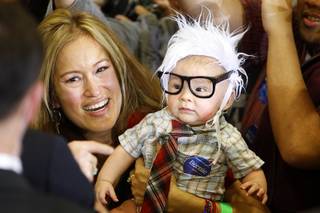
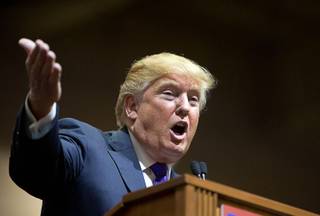
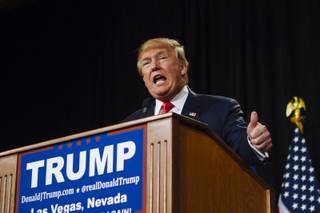
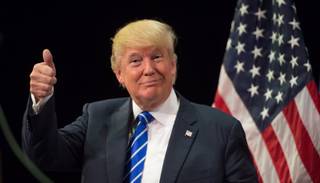
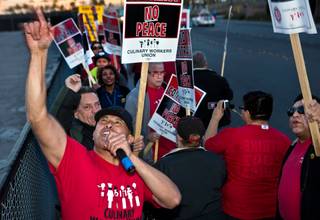
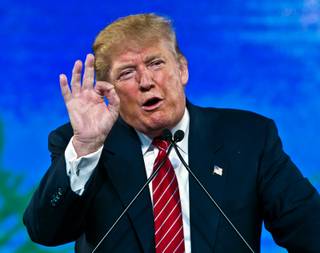
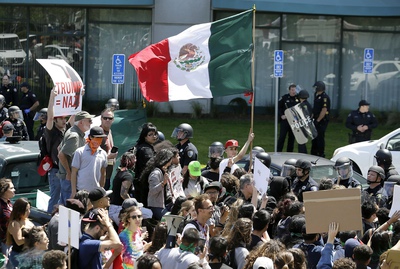
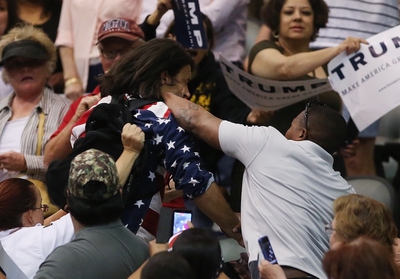

Join the Discussion:
Check this out for a full explanation of our conversion to the LiveFyre commenting system and instructions on how to sign up for an account.
Full comments policy